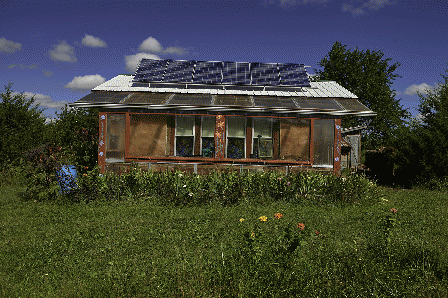ML: Part of the motivation to write this book is my hope to change this. The former Executive Director of the Fellowship for Intentional Community estimates that only about .003% of the US population was living in a community like this five years ago. But at the peak of the Israeli intentional communities movement, they had 3% of their population in cooperative living situations, so it is definitely possible for us to grow this movement, and I think it is time. And right now, we are seeing a jump in interest.
Publicizing successful, functional projects like Dancing Rabbit is one of the ways that we can grow that movement: most people simply don't realize there is a viable, well considered alternative to the rat race and social isolation.
Perhaps more relevant in the short term, there is a lot that can be learned from these communities and adapted. Car share programs are a good example of a technology that was first developed in income sharing intentional communities and has become a very impactful urban adaptation.
The Transition Town movement actually took significant inspiration from residential intentional communities when it was first started by Rob Hopkins in the UK, and has gained a lot of ground in the US in the past few years. And one of the big trends right now is tiny houses, and there are more initiatives than I've been able to keep track of to create tiny home villages, including initiatives in several major cities to use tiny home villages as a partial solution to homelessness.
So the reality is that what I'm advocating for can look a lot of different ways, and they are becoming less fringe and more widely accepted every day.

Tiny houses like this one at Dancing Rabbit Ecovillage in Missouri are a key trend in climate solutions.
(Image by Dancing Rabbit Ecovillage) Details DMCA
JB: I like it! Did we talk about Commonomics USA? I'm pretty sure that many of our readers are unfamiliar with it. What is it and what are its goals?
ML: Commonomics USA is an economic justice organization that is working to re-establish the Commons as a vibrant concept and material reality for all of us. The US is strongly oriented toward privatization as the way to solve our problems, and what we've seen is a significant diminishment of good stewardship of natural resources as well as the loss of community in many places as a result.
We promote economic-justice oriented public banking, do classism education, and link economics back to ecology through things like our Divest and Build Coalition work in California, and a fledgling project that Matt Stannard (our Policy Director) and I are working to promote the idea of what Matt calls climate egalitarianism, where we work on local community-based climate solutions that fully integrate the needs of working class and poor people.
(Note: You can view every article as one long page if you sign up as an Advocate Member, or higher).





